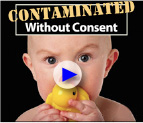Every day businesses and governments are taking concrete steps toward safer chemicals use and management. To find out more, contact Coming Clean at (802) 251-0203; info@comingcleaninc.org.
Safe Markets Press Releases
NOVEMBER 12, 2015
(Goodlettsville, TN) Today, consumers and families concerned about toxic chemicals found in products sold by the discount retail chain 'Dollar General' held a demonstration and delivered 150,000 petition signatures urging the chain to take action and protect its customers. Corporate officials from Dollar General accepted the petition signatures, but would not respond to the campaign's request that they work with suppliers to phase-out toxic chemicals from their products or even to a meeting campaign representatives to discuss just and equitable corporate chemicals policies to protect their customers and their families.
FEBRUARY 4, 2015
The Campaign for Healthier Solutions – a group of over 100 health, community, and environmental justice organizations around the country – released a report today about toxic chemicals found in dollar store products. The report -- A Day Late And A Dollar Short: Discount Retailers are Falling Behind on Safer Chemicals – includes testing results for 164 dollar store products such as toys, jewelry, school supplies and other household items, that found over 81% (133 of 164) contained at least one hazardous chemical above levels of concern.
AUGUST 4, 2014
Toxics in Dollar Tree Store Products? New Mega-Merger Provides Opportunity toProvide Safer Products
MARCH 17, 2014
Buy Buy Baby Asks Vendors to Remove Toxics from Products
(Albany, NY) Getting ReadyforBaby, a coalition of children’s health, public safety, and environmental organizations, applauded the move by Buy Buy Baby and its publicly-traded parent company, Bed Bath & Beyond, to move its suppliers to transition away from toxic chemicals linked to a wide range of health problems. Bed Bath & Beyond has developed a new “Restricted Substances List” (RSL) of chemicals of potential concern for human health and the environment. The list lays out chemicals recommended for reduction or elimination in consumer products, and chemicals that should not be intentionally introduced into the manufacturing process. A number of chemical limits on the Restricted Substances List exceed regulatory requirements.
DECEMBER 19, 2013
Toxic Chemical Linked to Cancer Found in Toys Added to CA Prop 65
DECEMBER 11, 2013
DECEMBER 4, 2013
A New Report from Environmental Defence Canada Finds Which Cosmetic Companies Are Naughty and Nice
(Toronto, ON) New pocket guide included for choosing less toxic cosmetics.
NOVEMBER 21, 2013
Toxic Flame Retardant Chemicals No Longer? New California Regulation Announced Enables Fire Safety Without Toxic Flame Retardants
(San Francisco) Physicians, scientists, consumer and parent advocates, firefighters, furniture manufacturers and retailers celebrated a hard fought change in California regulations that now enables furniture made for sale for the state to meet a fire safety standard without the use of toxic flame retardant chemicals.
October 22, 2013
Maker of Air Wick, Lysol Commits to Disclose Fragrance Allergens
(Parsippany, N.J.) Reckitt Benckiser (RB) announced today that it would become the first major cleaning product company to disclose fragrance allergens in its U.S. products, a major step forward in breaking the secrecy around fragrance ingredients in household products. Women's Voices for the Earth Release
October 16, 2013
Target Focuses Bull's-eye on Chemicals in Products: Launches
New Standard to Promote Ingredient Safety and Disclosure
(San Francisco) Moved by consumer demand for safer products, the retail giant Target is creating a new sustainability standard that will evaluate and rank baby and adult personal care and cleaning products based on ingredient safety and disclosure and environmental impact. Target has asked the Campaign for Safe Cosmetics to collaborate on developing a standard for cosmetic safety in 2014.
OCTOBER 15, 2013
Toxics in Baby's Bed: 65 Organizations Launch Getting Ready for Baby Campaign
Las Vegas, NV — Report reveals that companies are responding to market
pressure and phasing toxic chemical flame retardants out of baby crib mattresses.
SEPTEMBER 13, 2013
Walmart Requires Suppliers to Phase out Hazardous Chemicals: NGO Statements
United States — Environmental, health and consumer groups react to the news about Walmart's new policy to require disclosure and substition for hazardous chemicals used in personal care products, cosmetics and cleaning products.
AUGUST 22, 2013
Toxic Worries? SafeMarkets.org Helps Find Safer Products
New York — Information gathered by advocates investigating toxic chemicals in food, baby products, toys, furniture, construction materials and other consumer goods was unveiled on a brand new website today to help shoppers, including families, builders, and others, learn how to identify potentially harmful products and find safer ones.
JULY 31, 2013
Toxic Chemical Reform: Senate Hearing Investigates How to Fix Broken Chemical Safety System
Washington, DC — The Senate Environment and Public Works Committee convened a hearing today called "Strengthening Public Health Protections by Addressing Toxic Chemical Threats," with panels of experts addressing the complex issues regarding toxic chemicals exposure.
April 15, 2011
Safe Chemical Act Good for Business Revives the Economy: Business and Investor Communities Welcome Chemical Reform
Washington, DC — The American Sustainable Business Council (ASBC) announced today that it supports Congress to help rebuild the economy and create a new wave of jobs and innovation through the use of green chemistry and sustainable materials with production away from hazardous chemicals.
BPA Press Releases
For the most current News Releases on BPA, Consult Breast Cancer Fund and Consumer's Union
March 30, 2012
Toxic BPA: FDA Rejects NRDC Request to Remove BPA From Food Supply
Washington, DC — The Food and Drug Administration (FDA) made an announcement today responding to a petition from the Natural Resources Defense Council (NRDC) to prohibit BPA use as a food additive. FDA has stated it will not ban BA. FDA has stated it will not ban BA. The Wall Street Journal has reported that FDA says it "lacks scientific information" to restrict the chemical.
November 10, 2011
Toxic BPA: Chemical Industry Claims American Baby Bottles & Sippy Cups Are BPA-Free, Asks FDA for New Rule
Washington, DC — The American Chemistry Council issued a statement on Friday about the synthetic sex hormone bisphenol A ( BPA) that some of its member companies produce, an endocrine disrupting chemical made from petroleum products used in canned food linings, thermal receipt paper, and many polycarbonate plastic products such as baby bottles and sippy cups. Nearly a dozen states have already implemented restrictions on BPA.
June 9, 2011
Letter to FDA regarding BPA in Cans Study
We are writing in response to the U.S. Food and Drug Administration's recent publication of research that shows that BPA leaches from the linings of canned foods into the foods themselves. As members of the Workgroup for Safe Markets, and authors of No Silver Lining: An Investigation into Bisphenol A in Canned Foods (May 2010), we were not surprised to see the results of FDA's study; they are consistent with our report and several others.
January 27, 2011
Ban Toxic BPA: Environmental Health Groups Support New Bills in Congress
Washington, DC — Environmental health advocacy groups concerned with toxic chemicals in food and beverages applaud Senator Diane Feinstein and Representative Edward Markey, who both introduced bills this week to limit hormone-disrupting chemical bisphenol A in baby bottles, sippy cups and food and beverage containers.




